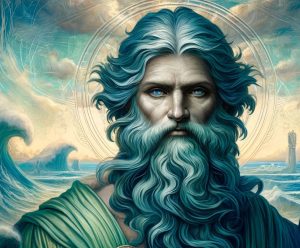Who was Thaumas in Greek Mythology
Thaumas is a lesser-known figure in Greek mythology, belonging to the earliest generations of deities. As a primordial sea god, Thaumas’ myth offers insight into the ancient Greeks’ understanding of the world’s natural forces, particularly those associated with the sea and the sky.

Thaumas married Electra, one of the Oceanids, who are the daughters of the Titans Oceanus and Tethys. This union underscores the interconnectedness of various water deities in Greek mythology. Their offspring include notable figures such as Iris, the goddess of the rainbow and a messenger for the gods, particularly Hera. Iris is often depicted as a beautiful maiden with golden wings, symbolizing her role as a link between the realms of gods and mortals.
Thaumas and Electra are also parents to the Harpies, wind spirits known as Aello, Ocypete, and Celaeno, who are often depicted as birds with the faces of women. The Harpies are associated with sudden, destructive wind storms and sometimes act as agents of punishment. Another lesser-known child of Thaumas and Electra is Arke, who sided with the Titans during the Titanomachy and was later punished by Zeus.
Thaumas embodies the awe and wonder associated with the sea. His name, derived from the Greek word “thauma,” meaning “wonder” or “marvel,” reflects this aspect. As a sea god, Thaumas represents the mysterious and awe-inspiring nature of the ocean, which could be both beautiful and terrifying to ancient people.
Thaumas is not prominently featured in many myths, but his presence is noted in several classical sources. Hesiod’s “Theogony” mentions Thaumas in its genealogical account of the origins and relationships of the Greek gods. This text is one of the primary sources for information about Thaumas and his descendants. Though Thaumas himself is not directly mentioned in the Homeric Hymns, his children, particularly Iris, appear in various hymns and epic poems, emphasizing their roles in the divine hierarchy.
Thaumas, though not a major deity in the Greek pantheon, plays an essential role in the broader context of Greek mythology. His marriage to Electra and his offspring connect him to the complex network of gods, goddesses, and mythical creatures that populate Greek myths.
As a primordial deity, Thaumas links to the ancient conceptions of natural forces and the early cosmology of the Greeks, personifying the wonder and awe inspired by the natural world. Through his children, particularly Iris, Thaumas’ influence extends into the daily life and religious practices of ancient Greeks. Iris, as a messenger, is a vital figure in many myths and religious rituals.
Thaumas is a fascinating figure whose mythology highlights the ancient Greeks’ reverence for the natural world. As a primordial sea god, his lineage and offspring emphasize the interconnectedness of natural phenomena and divine entities.
